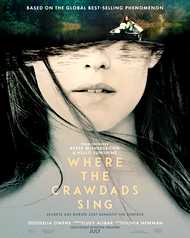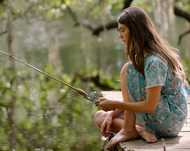Where the Crawdads Sing
 for sexual content and some violence including a sexual assault.
for sexual content and some violence including a sexual assault.
Reviewed by: Shawna Ellis
CONTRIBUTOR
| Moral Rating: | Offensive |
| Moviemaking Quality: |
|
| Primary Audience: | Young-Adults Adults |
| Genre: | Coming-of-age Mystery Drama Adaptation |
| Length: | 2 hr. 5 min. |
| Year of Release: | 2022 |
| USA Release: |
July 15, 2022 (wide release—3,650 theaters) DVD: September 13, 2022 |







Life and adventures of a young girl named Kya as she grows up isolated in the marsh of North Carolina between 1952 and 1969
Domestic violence
Abandoned by her mother
Alcoholic, gambling father
Learning self-reliance

Coming of age of a wild and independent illiterate girl
Facing prejudice from children and adults
Called “nasty” and “filthy” by a pastor’s wife

Temporary romantic relationship with a high school boy
Being used by another boy for sex after promising marriage
What is sexual immorality?

Sexual lust outside of marriage—Why does God strongly warn us about it?
Is there a way to overcome excessive lust for sex?
Purity—Should I save sex for marriage?
Sexual assault
Tricks and dating rituals of local boys

Teens! Have questions? Find answers in our popular TeenQs section. Get answers to your questions about life, dating and much more.

Investigation into the apparent murder of a local celebrity of Barkley Cove, a fictional coastal town of North Carolina
Accused of being a murderer
About murder
About death
| Featuring |
|---|
|
Daisy Edgar-Jones … Kya Clark Jojo Regina … Little Kya Harris Dickinson … Chase Andrews Taylor John Smith … Tate Walker Garret Dillahunt … Pa Joe Chrest … Dr. Cone David Strathairn … Tom Milton Ahna O'Reilly … Ma Eric Ladin … Eric Chastain Michael Hyatt … Mabel See all » |
| Director |
|
Olivia Newman |
| Producer |
|
Reese Witherspoon 3000 Pictures Hello Sunshine See all » |
| Distributor |
“Where the Crawdads Sing” is a much-anticipated film for fans of the popular novel by the same name. With backing by actress Reese Witherspoon the book became a huge success, selling over 15 million copies to date and likely to sell more with the release of the film. Witherspoon was so drawn to Delia Owens’ book that she produced the film and has been promoting it heavily. Thus far it is gaining favorable reviews from fans of Owens’ novel who are praising its faithfulness to the source, but movie critics are not terribly impressed with its awkward script and clunky timeline.
The story follows the life of intelligent and resourceful Kya Clark (Daisy Edgar-Jones) as she grows up alone on the coast of North Carolina. The movie jumps between portrayals of Kya at various ages, but I feel that we never get to spend enough time with any one of these so that we can really learn who she is. Kya as a young girl is played wonderfully by Jojo Regina, giving one of the better performances in the film. We briefly see her troubled upbringing under an alcoholic abusive father, her abandonment, and the struggle to survive in a world that doesn’t approve of bare-footed “swamp trash.”
Then we see teenage Kya onscreen for some time before suddenly jumping years ahead to young adulthood, with both ages portrayed by a wide-eyed and earnest Daisy Edgar-Jones. These scenes are presented through a series of flashbacks narrated by young adult Kya to a defense attorney, detailing her life as the mysterious and maligned “Marsh Girl.” Many viewers will be drawn to the loneliness and heartache of this young woman as she faces difficulties and prejudice. Most of the townspeople regard her with contempt and are quick to assume the worst when an arrogant local hotshot is found dead in the swamps.
This is a film in which the coastal setting plays a pivotal role, almost as if the marsh itself is a character. While the location is certainly beautiful, in many scenes it seems almost too perfect and manicured. Forest clearings supposedly deep in the swamp have closely trimmed grass, poorly rendered CGI birds and swirling leaves create an almost silly contrived romantic setting, and everything seen beyond the initial time with little girl Kya seems far too clean and neat considering the circumstances.
The film presents itself as the tale of a mysterious loner who lives in isolation, but we see Kya walking down the street, sitting near a teenage beach party, boating past fishermen, and visiting a general store with regularity (almost daily to sell mussels). I could see that judgmental townspeople might have disdain for a poor illiterate unkempt child, but young adult Kya presents herself quite normally and frequently for such a supposed figure of legend.
“Carolina,” a new song which Taylor Swift wrote for this film (used in the credits) is hauntingly beautiful. It conjures up images of a lonely misunderstood figure of mystery, but in the movie we see much less of Kya alone than we do of her interacting with others. I wish that the tone of the film had been more akin to the song and novel.
As it is, much of the mystery and melancholy of the book is lost in its transition to the big screen. A somewhat awkward attempt is made to hit certain notes and insert particular lines from the novel even at the expense of flow and pacing. Character motivation which can be made clear in a 368 page book just can’t always be explored in a 2 hour film, leaving the movie a bit abrupt and choppy. In an attempt to be faithful to the source (and it is), the film suffers from trying to fit too much content into too little time. Characters seem rather flat as a result.
I found it hard to fully immerse myself in the story as we are made to abruptly shift timelines. This nonlinear contrivance worked well in the novel, but poorly translates to film, and the result is jarring. The lack of time spent on developing certain characters or exploring their thoughts also makes certain actions seem almost inexplicable.
Actor Taylor John Smith tries his best as the almost too-good-to-be-true Tate Walker, and Harris Dickinson gives a similarly restrained performance as local football hero heart-throb Chase Andrews. These two men are so diametrically opposed that they seem almost like caricatures.
Much of the film focuses on not judging a book by its cover, but then offers up one-note stereotypes as characters… the perfect friend, the bad boy, the kindly shopkeepers, the sympathetic lawyer, the abused mom, the drunk dad, the suspicious cops, etc. Many of the actors in these roles are gifted performers and are clearly trying to bring life to their characters, but they have little with which to work in dialog and script. The results feel similar to a made-for-television movie, when it could have been so much more.
There is some strong acting from a few of the cast even in their limited roles. The lawyer Tom Milton (David Strathairn) seems to genuinely care about Kya and the gravity of her plight. Similarly, the African American shop-owners Mabel (Charlene Michael Hyatt) and Jumpin’ (Sterling Macer Jr.) are given just enough screen time that we begin to get a sense of their characters.
Those who know the novel will be aware that physical abuse and Kya’s blossoming sexuality are major themes of this story, but casual moviegoers may be surprised at the amount of violence and sexual content present.
More so even than these issues, I found the worldview of “belonging to nature” to be problematic for Christian viewers. Since Kya has been failed by most humans, she turns to the marsh. In studying the plants and creatures of her environment, she finds a sense of kinship and belonging. In an opening monologue, Kya explains that the swamp does not equate death with sin, and it is easy to see that this worldview extends to other issues of morality (comparing human marriage to the pairing of wild birds and murder to the mating habits of certain insects).
Q & A
What is DEATH? and WHY does it exist? Answer in the Bible
About the fall of mankind to worldwide depravity
What is SIN AND WICKEDNESS? Answer
Credit is never given to a Creator of the natural world that Kya loves, but rather to an unthinking evolutionary process. In speaking about death, she references becoming “part of the marsh.” This view of nature lends itself to justifying anything (no matter how morally wrong) because “it’s natural” or “it is part of survival.” That thinking has led many people astray, and I worry that such a worldview could have a negative impact on impressionable viewers.
In reviewing films, we are instructed not just to take note of obviously inappropriate content such as foul language or nudity, but to look for the message that a film is promoting. Feeling kinship with nature does not excuse us from morality, and it is a false worldview to believe that we become a part of some semi-sentient natural world at death. We are created by God to be different from the rest of the natural world… we are made in His image and created for His glory (Isaiah 43:7), not as just another animal living by instincts and therefore free from moral constraint or consequence.
Many might feel that Kya is morally justified in her actions because she is simply acting as nature does, but most viewers would consider behavior by other characters in the movie that are also found in nature to be morally wrong (such as sexual aggression and infidelity). This is a very inconsistent worldview and in my opinion the most problematic aspect of the film.
The movie is effective and accurate, however, in showing how loneliness and abandonment by those who were meant to care for us can deeply affect a child and have repercussions throughout a lifetime. It also shows the pain and isolation which come from being considered an outcast. Those who are not shown their true worth in Christ will seek it elsewhere, often leading to bad decisions and dire consequences.
The only Christian influence found in the movie comes from Jumpin’ and Mabel, who show compassion for Kya as a child. Jumpin’ initially feels they should be cautious about interfering, but Mabel points out that Jesus did not ask us to “be careful” but instead to help the least of these (referencing Matthew 25:40).
Content of Concern
Language: A few uses each of “d*mn” and “h*ll.” God’s name is used in vain at least three times. One use of “sh*t,” two of “son of a b*tch,” one of “b*stard,” one of “a**.” Sexual terms such as “do it” and “whoring” are used. A black man is called “boy” by a younger white man. A girl is referred to as “trash.”
VIOLENCE: Several instances of domestic abuse are shown, including a small child being hit and thrown roughly. Children listen to the sounds of an offscreen beating. Bruises and injuries are shown. Someone is chased and captured. A dead body is seen. A character attempts to sexually assault another. A man and woman attack with kicks and punches. Two men have an aggressive exchange of blows.
DRUGS/ALCOHOL: A scene takes place in a bar. A character drinks and is portrayed as an alcoholic. A child is sent to purchase liquor. Beer is seen at a beach party. One character drinks beer on a few occasions.
SEX/NUDITY: There are several scenes of unmarried couples embracing and kissing passionately, sometimes stopping there but on two occasions leading to sex with some movement and sound but no nudity. Men are seen shirtless and a woman disrobes and is nude, but nothing is shown below the shoulders. A hand caresses a bare hip or thigh in close up. Friends discuss how the “Marsh Girl” is in bed, with one answering that she is “wild like an animal.” After a hasty and painful first sexual encounter, a man tells a woman that sex will get better the more she does it. There is a lengthy and intense scene of attempted rape.
I was not very impressed with “Where the Crawdads Sing,” but there may be some who will find this a satisfactory telling of a popular story. Please be cautioned that if it is to be watched at all, it is best suited for mature and discerning viewers due to a false worldview and problematic content.
- Profane language: Heavy
- Sex: Moderately Heavy
- Violence: Moderate
- Vulgar/Crude language: Moderate
- Nudity: Moderate
- Drugs/Alcohol: Moderate
- Occult: Minor
- Wokeism: None
See list of Relevant Issues—questions-and-answers.


Yes, I would recommend this movie (to the age appropriate audience).
Moral rating: Average / Moviemaking quality: 4
In contrast, her new life, characterized by adaptation and survival akin to Evolution, was depicted as more secure and constant.
Of further concern is the fact that the murder of the main antagonist by Kya is justified based on the law of nature.
The film further challenges traditional values in its portrayal of marriage, as Kya rejects its necessity, emphasizing the prioritization of natural principles over the Biblical notion of God guiding our lives.
This thematic departure left me grappling with the conflicting perspectives presented in the narrative. I see the underlying message in the film as an attack on Christian values and the fact that nature is elevated to the position of God.
Moral rating: Offensive / Moviemaking quality: 4
The unsatisfying handling of the ending also undermines the whole mystery aspect of the book and the critical revelations the book offers about the key character.
Despite the lush coastal scenery, this is a dark film. It includes the disturbing themes of domestic violence, sexual assault and rape. David Strathairn, one of my favorite actors, gives a superlative performance as a lawyer, and for me, he was the best part of the movie.
Moral rating: Very Offensive / Moviemaking quality: 3½
PLEASE share your observations and insights to be posted here.


On the positive side, the film is very well “shot.” The marshland of North Carolina, which is really Louisiana but that doesn’t matter, is very well-produced for the big screen. You almost feel like you’re there amongst the birds and the hanging mosses. It helps me understand why people who have grown up in that environment want to see it preserved. It’s breathtaking. Also, the acting, particularly on the part of Daisy Edgar-Jones is superb. She does a brilliant job of showing Kya’s fawnlike shyness and innocence and her desire to reach out and share with people she can trust.
Also, the story itself is quite engrossing and enjoyable.
On the negative side, I guess my main concern would be with the naturalistic worldview that Kya seems to embrace. It’s disturbing to hear. At the beginning of the film she writes that in nature, death is neither right nor wrong, good nor bad. It’s simply nature doing what nature does.
Later in the film she elaborates on the mating habits of certain insects like the praying mantis and how the female lures the male and eventually devours him. If one is taking cues from nature, one can see how it might be a logical next step to kill somebody if one feels that it’s warranted or expedient to do so. In Genesis 9:6 it says “He who sheds man’s blood, by man his blood shall be shed. For in the image of God He made man.” This is why regular Bible reading is important. We need to be reminded of God’s ways instead of our own.
Overall, I have to say I loved the film and would recommend it to anybody age eighteen or above, but I would not recommend it for young impressionable viewers. Given the naturalistic world view I think the film is only suitable for mature viewers who can parse through the complex issues it raises.
My Ratings: Moral rating: Offensive / Moviemaking quality: 5